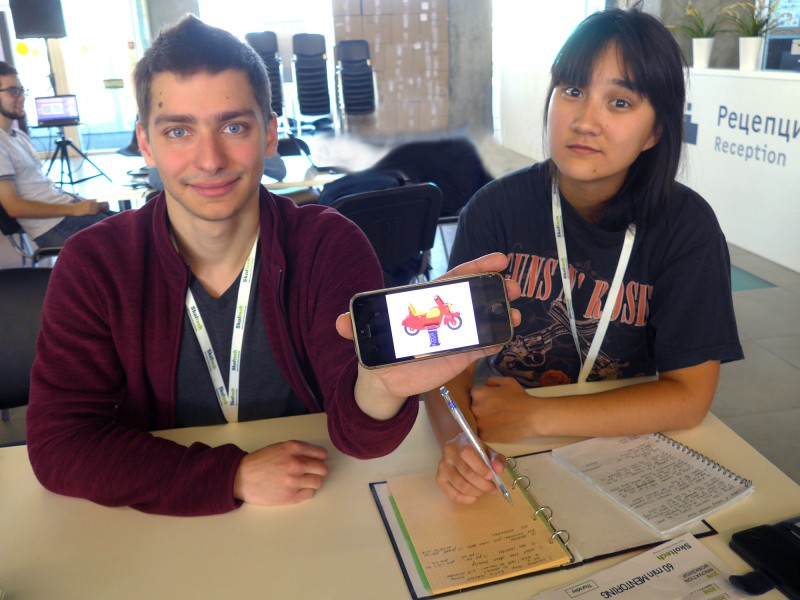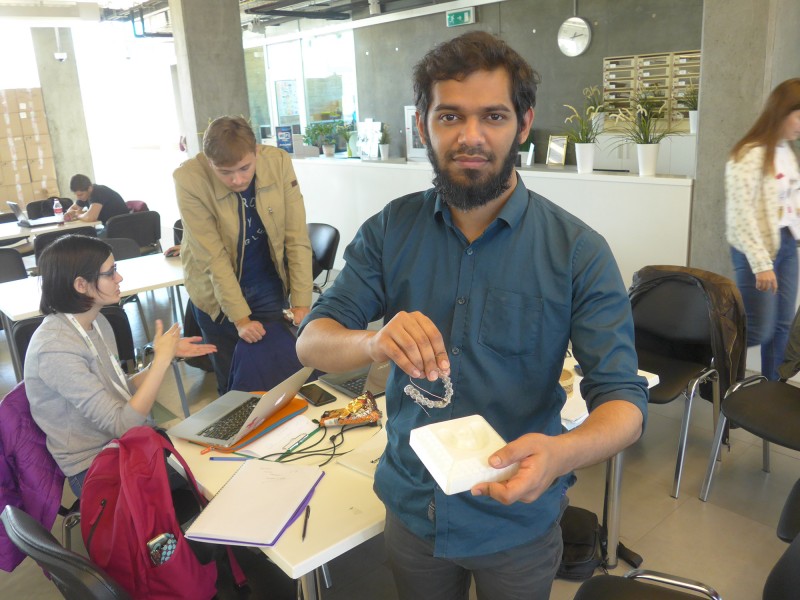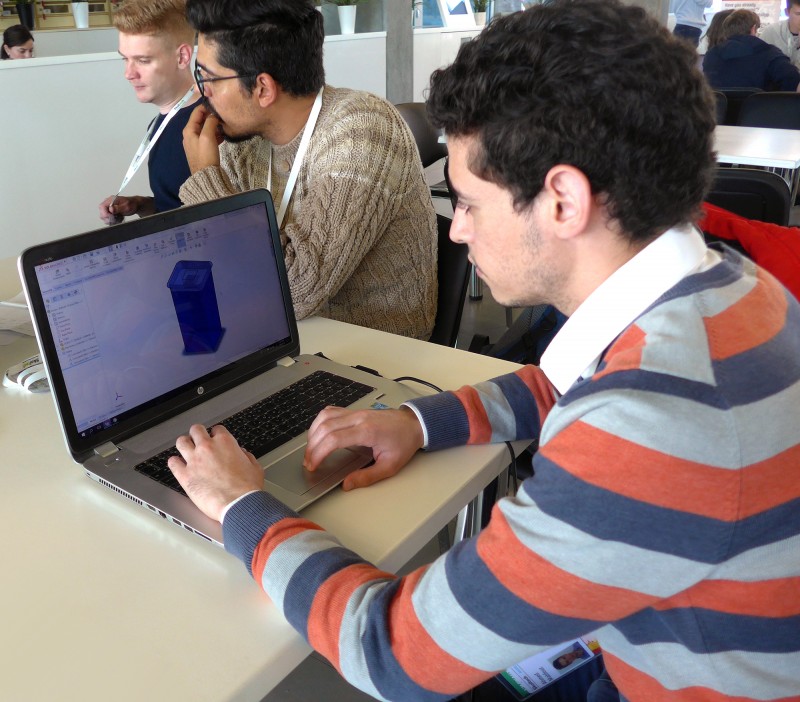Today marks another milestone in Skoltech’s Innovation Workshop, with the institutes’ 350-plus master’s students outlining the progress of their innovation projects that are being evolved during this month-long “boot camp-style” exercise.
A total of 63 teams are working on separate projects, with the groups at different stages of the creative process: some have a clear sense of direction, while others are trying to figure out how to move their ideas forward – with experienced mentors invited from around the world on hand to help.

The Innovation Workshop’s motorcycle driving simulator team created a cartoon-type drawing that reflected the less-than-encouraging first contact with driving schools.
Organized by Skoltech’s Center for Entrepreneurship and Innovation, the workshop is structured to instill the spirit of innovation and provide skills for future success in entrepreneurship, research, science and technology. It is the initial course for the institute’s incoming class, while also including certain second-year students who missed the workshop during their initial phase of studies.
One project team’s creative idea was to build a motorcycle driving simulator, using virtual reality to provide drivers with the necessary experience without exposing them to the dangers while they are still learning. “Some motorcycle simulators already are on the market, but they do not implement virtual reality to our knowledge; therefore, they don’t deliver the same level of intricate details and aspects of driving a motorcycle,” explains Marina Pak, one of the team members.

The “Smart braces” project would facilitate the monitoring of how teeth adjust while using the braces.
As part of Skoltech’s innovation project exercise, students are asked to contact potential users, and the team received a cold reception from their first target: driving schools. Benefitting from the input of Innovation Workshop mentors, the team’s approach is focusing more on the insurance sector – with its companies potentially benefitting from lower accident claims when motorcycle drivers are better trained.
Another group decided to apply innovative technologies to dentistry, creating so-called “Smart braces.” This device, along with an app, will allow dentists to monitor their patients’ braces and make sure the teeth are adjusting as intended in the braces; patients themselves also will be able to track progress with the app. Currently, it can take weeks or even months of follow-up appointments to figure out if there are problems, so this technology will simplify the process for all parties involved – and give patients a peace of mind (as well as possibly saving money).
More than one project is focused on health: A student team decided to work on “smart insoles” that could be used for orthopedic purposes, using sensors built in them. While students also are thinking of encouraging athletic uses for these insoles to improve performance and minimize health risks, Alexy Khrabrov, one of the Innovation Workshop mentors, suggested an additional – more fun – application for this technology: teaching people how to dance, using the sensors to provide “guidance” for taking the proper dance steps.
Reflecting on teams’ performance, Innovation Workshop mentor Alexy Khrabrov said: “The students are excellent; many of them are coming from the best Russian and foreign universities, from a variety of different backgrounds. This gives the workshop an incredible spirit.”
At least one project is focusing on subject that could mean life or death. Its group is working on a drone that could locate lost persons, using computer vision and networks to analyze the data and alert authorities or volunteer SAR (search and rescue) organizations. “While certain companies already are doing something similar, the current technologies are still relatively slow, so we are trying to improve the process by speeding it up,” says Noreen Halimani, one of the project team’s students.
Discussing her experience of the Skoltech Innovation Workshop, student Noreen Halimani calls it “quite enlightening.” She explains: “I realized you should have an open mind; there is strength in teamwork. We are from different backgrounds, but we work well together.”
An idea that is considered for locations with cold winters is a snow clearing technology for vehicles that uses a type of film enhanced with sensors to melt the snow from the tops of vehicles. This team initially looked at the application for car owners. Their international mentor, Othmar Stein – an automotive industry consultant and a former vice president of DaimlerChrysler – suggested the team widen their scope to the commercial vehicle industry, particularly for large tractor/trailer trucks, which often pose a danger on roads when shedding snow that has accumulated atop the vehicles. Insurance companies also could be interested in backing the concept with the goal of lowering claims, Stein said during his guidance session with students.
A smart bus scheduling technology that can change or modify a bus route based on the number of people at each station was conceived by one of the workshop groups. If implemented, it could offer the promise of creating more dynamic routing that responds to demand.

Students are working on a GarbTech prototype in preparation for today’s Innovation Workshop presentations.
The focus of a separate project incorporates games in education to tackle a serious issue: recycling. Designated “GarbTech” by its team, this effort focuses on children’s education on the environment and recycling. GarbTech is a smart garbage bin that collects plastic bottles and uses an object detection system to recognize plastic from other materials. In partnerships with environmentally-conscious organizations, the students are hoping to create school competitions to determine who recycles the most plastic bottles – educating kids in the process.
See the other Innovation Workshop for additional perspective on this month-long Skoltech challenge:
- “This is a huge experience!” A student’s take on the 2018 Innovation Workshop at Skoltech
- International mentors at Innovation Workshop praise the program as they share their experience with students
- Learning by doing: Skoltech students focus on their Innovation Workshop projects
- Skoltech students share their initial impressions of the 2018 Innovation Workshop
- Professors share Skoltech’s expertise as students begin preparing their 2018 Innovation Workshop projects
- Students take an “interstellar tour” to learn English and communications skills during Skoltech’s Innovation Workshop
- Skoltech’s Innovation Workshop brings real-world challenges, experience and learning to the institute’s new students
Contact information:
Skoltech Communications
+7 (495) 280 14 81
